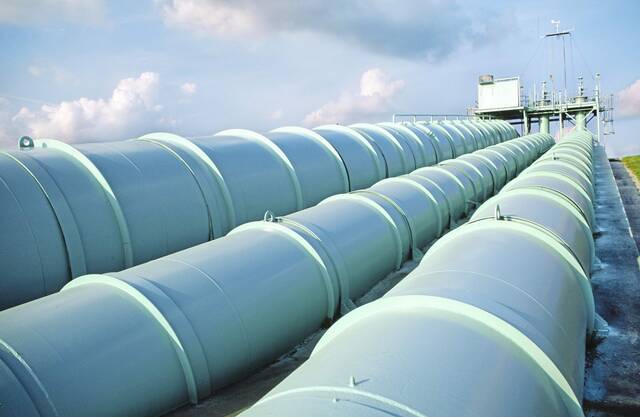https://naviga.triblive.com/opinion/erika-strassburger-and-josh-joswick-better-oversight-of-us-pipelines-needed/
Erika Strassburger and Josh Joswick: Better oversight of U.S. pipelines needed

An estimated 3 million miles of natural gas pipelines crisscross the U.S. When these pipelines leak, harmful pollutants are released that threaten our communities’ safety, exacerbate the climate crisis, and result in the loss and waste of a taxable public resource. And, as is often the case when it comes to pollution, emissions from these pipelines disproportionately impact lower-income households and BIPOC communities.
Methane is the primary component of natural gas and a powerful greenhouse gas more than 80 times as potent as carbon dioxide. This means methane released into the atmosphere through leaking natural gas pipelines is a direct contributor to the climate crisis.
We can protect our climate and address this environmental justice issue through better oversight of our gas pipelines, which the U.S. Department of Transportation, Pipeline and Hazardous Materials Safety Administration (PHMSA) is working to accomplish by updating a set of federal standards. This spring, PHMSA released a draft rule to reduce methane emissions and improve public safety by enhancing leak detection and repair (LDAR) requirements for natural gas pipelines.
The proposal includes important provisions, such as more frequent surveys to identify leaks, faster repair requirements with priority given to leaks that pose public safety and environmental risks, and increased public transparency regarding leaks and their safety impacts. The rule would also require operators to minimize operational methane releases from pipelines — which is good for government coffers as well as our climate.
However, some vital improvements must be reflected in the final rule if we want to protect our communities from pollution and prevent further damage to the climate.
First, PHMSA’s proposal should include clear and rigorous requirements for using advanced LDAR technology to capture emissions from intentional releases, rather than leaving it up to operators to decide how they’ll minimize waste. This will ensure operators take advantage of the best and most efficient technology available to reduce methane pollution.
PHMSA’s leak detection and repair standards should also apply to all gas-gathering pipelines — of which there are more than 430,000 miles across the country — rather than just the 100,000 miles of pipeline covered within the current proposal. Moreover, all leaks should be considered hazardous and thus required to be repaired. Doing so would capture more methane emissions and consequently do more to protect public safety and the climate.
Additionally, these standards should apply not just to natural gas pipelines, but to other pipeline systems as well, including hydrogen pipelines. This is especially important as the demand for hydrogen transportation is on the rise. To increase transparency and public safety, PHMSA’s rule should also require operators to disclose to regulators when they mix hydrogen into natural gas pipeline systems.
In the interest of consistency, transparency and ensuring successful implementation, the rule’s reporting standards should match those of the Environmental Protection Agency’s.
Finally, PHMSA should remove a provision in the current proposal that exempts operators from repairing leaks on pipes scheduled for replacement within five years. Five years is a long time to allow methane to go to waste and pollute the atmosphere unchecked; therefore, the exemption is not acceptable under a rule that promises to protect public health and safety.
Though our communities are on opposite sides of the country, climate change — and the man-made pollution that causes it — is an issue that affects us all. From Pittsburgh, where nearly half of the state’s top 12 polluters are based, to southwest Colorado, which is home to the nation’s largest concentration of methane pollution, we are reminded daily that when it comes to climate change, we can’t afford to leave a single stone unturned.
PHMSA’s proposed standards have been identified as a key policy in reducing methane emissions. We call on PHMSA and Transportation Secretary Pete Buttigieg to make these key improvements to the proposal — and swiftly enact it — to ensure our natural gas pipelines are governed by the strongest possible standards to address the climate emergency and protect the most vulnerable.
Erika Strassburger is a member of Pittsburgh City Council. Josh Joswick is a former La Plata County commissioner and former mayor of Bayfield, Colo. Both are contributors to Western Leaders Voices, a program that helps amplify the voices of tribal, local and state elected leaders on conservation issues.
Copyright ©2026— Trib Total Media, LLC (TribLIVE.com)
